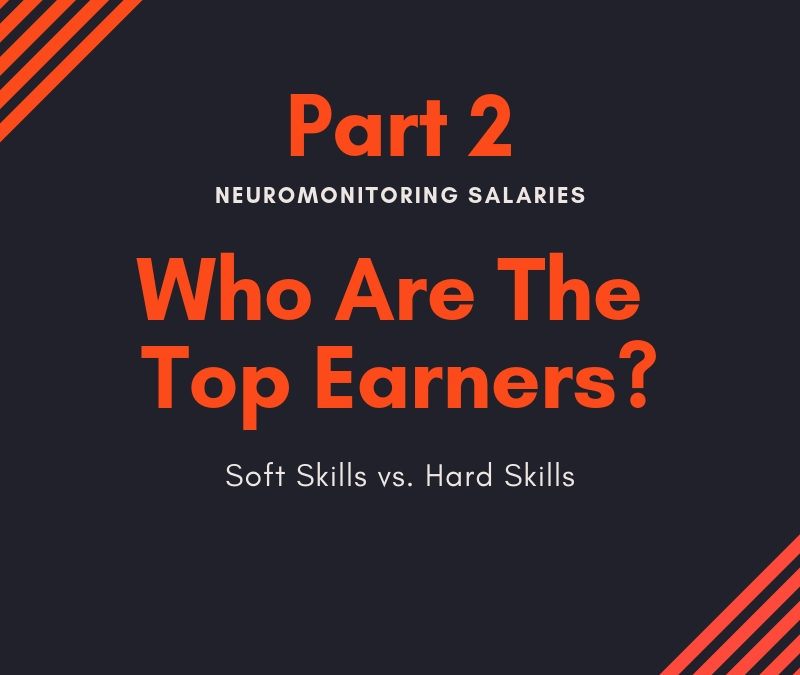In Response To High Earning Surgical Neurophysiologist Being The Best At Sales
[Joe’s notes: This is a guest post – or really a response to my previous post – that was insightful and, well, long enough to turn it into its own blog post instead of a comment.
Full disclosure: Craig and I are friends and previous colleagues. We held the same position at Sentient and had plenty of similar conversations around the IONM field in general. While we agreed on most topics, there was more than even a Craig-sized handful of items where we didn’t fully agree, or at least fully catch the point the other was making until we made a few more laps.
And that’s why having Craig, or someone similar, in your inner circle is so valuable. Do you have smart people calling you out on your BS, but in a completely constructive way? There is no growth without resistance.
Craig is a savvy veteran at this communications thing. Just look how gentle he was with my fragile ego that knows no bounds…

Do you see how he started with the small talk, followed by some more praise, and a thank you before he went for the close? And then followed up by an emotional “out” that I dare not take after such grace?
And if you’re reading that in a sarcastic tone, please go back and re-read those sentences with the intended tone of a job well done on how to communicate what could be a sensitive subject. He could have said “I found it a good read, but…” and changed the whole direction of the conversation.
Nevertheless, there is an undeniable formula being used here. And there is enough latitude in the interpretation of the English language that both professionalism and salesmanship could be used without feeling dirty.
But here’s the thing… the carefully selected words used by someone with a ton of managerial experience isn’t even the best “sales job.” It was the attachment where he brought out the big guns.
His bazooka, really.
I didn’t even really have to read the attachment. Craig has built up years of reputation and goodwill in the industry, has taught me a ton in personal experiences, and continues to provide value with no real endgame other than to be helpful.
You see, Craig gets what it means to provide a top-notch service and acts consistently in a manner that I described as “selling” and “closing.” And that’s exactly what I was advocating.
Where I fell short was carrying my word selection past the threshold of being purposefully provocative to instructional with full clarity. And this isn’t an isolated incident so that responsibility falls on me.
But even now that I’ve tried to better define the context of using words like selling and closing as metaphors for taking control of your own career management by always presenting the best version of yourself, you’ll see there are still some diverging opinions in the post.
And that’s OK. It’s better to have more experiences shared and come to the closest version of the truth as we can get.]
Here are the copy and paste of Craig’s note.
Response to Dr. Joseph Hartman’s “Surgical Neurophysiologist salary: Who are the high earners?”
By
Craig I. Matsumoto, DHSc, D.ABNM
11/27/2018
Dr. Joe Hartman’s blog entry “Surgical Neurophysiologist salary: Who are the high earners?” (11/1/2018) was an insightful post. It provided the reader with valuable vision into the thought processes of employers and the changing landscape of where the value lies in the IONM team member world.
As someone who spent about 17 years in IONM, I wanted to bring a slightly different perspective to some of Dr. Hartman’s observations.
I agree that one of the questions that employers of 10+ years ago asked themselves was to consider background and work history of potential new IONM fellows/trainees. But, the second question that was probably given priority was to ask how the candidate might acclimate to the medical subculture of the surgical environment. This would include responding to demands on time, effort, focus, communication, the ability to incorporate new skills, and especially the ability to perpetuate a patient-centric focus.
While I agree that teams ended up with some difficult to work with individuals, I would opine that this was the result of any growing organization or discipline. In health care alone, there are many difficult people to work with, from physicians to housekeepers. Although this did not always make for pleasant working environments, it did not mean that getting the patients what they needed was lacking or somehow less than if everyone was always happy and getting along. Sometimes, these people were the ones with creative ideas or new approaches to old problems. These are the positives and negatives of working with people….in any environment.
I also agree that small practices combining with larger corporations resulted in changes to IONM. I believe that an increase in sophistication was not, necessarily, a result of these corporate mergers. In some cases, the focus on the delivery of a high-quality clinical product was changed to the search for business efficiencies and a subdivision of responsibilities, which would normally be handled under a single roof. What used to be a point of pride in saying that “we’re an efficient business so that we can continue to provide great clinical care,” became “we’re a great business because we provide efficient clinical care.” A subtle but important distinction.
With this change of mission in mind, I would propose that hiring managers not only asked themselves who would be a good fit for OR teams to work with, but also who could they hire who would do the job at the most efficient cost to their organization.
I agree with Dr. Hartman that some soft skills can make a difference in today’s OR/IONM environment. This is true with every job that depends on the interactivity of a team to accomplish a focused goal. Now, most of us understand that money and income are important. However, I feel that you shouldn’t get into IONM if high-end incomes are your goal. It has been my recent observation that many people get into this business and, after 2-3 years, express an urgent desire to “do something else” with their careers. Business development, education, or administration are often noted as areas where these individuals wish to migrate. My general advice to these clinicians is to take a step back and examine where they are in their clinical careers. There is so much to learn in health care and medicine. Much of it we glance over and absorb with an insufficient depth in the practice of IONM. I challenge clinicians to remember why they wanted to enter the field and to honestly evaluate where they can improve their delivery of high-quality health care. I encourage them to find a mentor who has ideal clinical skills, knowledge, and focus. Ask that mentor for help in determining and accomplishing a clinical and administrative growth plan. In short, focus on being the best clinical provider that you can be. Focus on where you can make a difference for each patient that you encounter. Don’t worry about going somewhere else…worry about being better right here, right now.
While I agree that communication is important, I might differ from Dr. Hartman that we should always be thinking as sales professionals and “always be closing.” Instead, I would advise being the best professional that you can be. It’s like when I buy a car. I want to see the positives and negatives of the models on the lot. Rather than be sold, I want to evaluate their performance: See what fits my needs and desires. When a sales professional starts to push specific glossy specs to me, overtly trying to “close the deal,” I usually reject what they’re saying as hyperbole until proven otherwise. That’s not how a medical professional should come across. We don’t need to shine up an old junker. We need to be intelligent, thoughtful, and competent professionals.
Be the best neuromonitoring clinician that you can be. Be the most team-oriented, good communicator, that’s possible. Be a source of deep knowledge and expertise on IONM and all things that “touch” your IONM data. This includes surgical procedures, anesthesia, nursing considerations, and comorbidities/medicine that affect your neuromonitoring. Be well-read on the latest papers and research within the neuromonitoring community. For most of us, this is a professional lifetime of learning. That is the best “selling,” that you can do.
Please, consider taking your time and focusing on where you are, now. Being a clinical provider is an awesome responsibility. Patients and their families count on you to help make surgery as safe as possible. Don’t let them down by worrying too much about where you’re going with your career or where your salary could be going in the future. Be present. Focus on sharpening your skills and expanding your knowledge. Your patients will thank you. The OR teams will thank you. Your professional associates and employers will thank you. And, you will know that your profession is better because you are a contributing part of it.



As a counterpoint, there are plenty of people in healthcare that never have personal care over a patient that is part of the patient’s total care journey. Not everyone’s ambitions take the same path, and it often will change. An HBR podcast talked about Millenials, on average, will have more career changes than baby boomers will change companies. This is the fluid market we now live in.
So some might choose to jump in with 2 feet into patient care, others choose research, others academia, others operations, etc. Sticking out a primary patient care role might not be the best starting point of your career plan, even if that was the initial intent.
My suggestion, and I think I might get some buy-in from Craig here, is to recommend raising your hand to get some experience in whatever new interest arises. If your initial goal is to take a less direct path (“I want to be in IONM business development”), then either reassess your entry point or start looking for those type of mentors/responsibilities early and often.
In your car analogy, I would say that you added a third person to the equation that changed the math problem. I was speaking directly to SNPs and telling them to be the best version of themselves at all times. So I would be talking to the car, telling it to perform at the highest level possible every time someone turned over the ignition. That’s how you sell. You deliver.